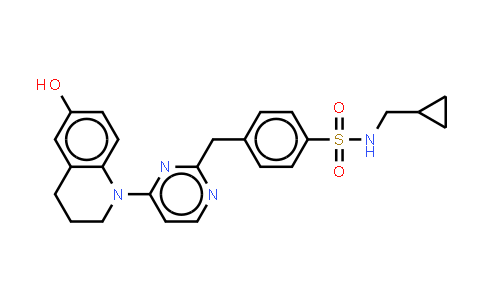| Chemical Name |
Pyrintegrin |
| CAS Number |
1228445-38-2 |
| MDL Number |
MFCD22124885 |
| Molecular Formula |
C24H26N4O3S |
| Molecular Weight |
450.55 |
Introduction of 1228445-38-2 :
Pyrintegrin is an β1-integrin agonist and a 2,4-disubstituted pyrimidine that promotes embryonic stem cells survival. Pyrintegrin enhances cell-extracellular matrix (ECM) adhesion-mediated integrin signaling. Pyrintegrin can be used as a podocyte-protective agent and has robustly adipogenic[1][2][3]. IC50 & Target: β1-integrin[2] In Vitro: Pyrintegrin (0-10 µM; 1 hour; hASCs) treatment inhibits BMP4-mediated phosphorylation of BMP responsive SMAD1/5 in a dose-dependent manner (IC50 of 1.14 μM)[1].
In vitro, Pyrintegrin stimulats human adipose stem/progenitor cells (hASCs) to differentiate into lipid-laden adipocytes by upregulating peroxisome proliferator-activated receptor (PPARγ) and CCAAT/enhancer-binding protein-α (C/EBPα), with differentiated cells increasingly secreting adiponectin, leptin, glycerol and total triglycerides. Pyrintegrin attenuates Runx2 and Osx via BMP-mediated SMAD1/5 phosphorylation[1].
Treatment with Pyrintegrin prevents damage-induced decreases in F-actin stress fibers, focal adhesions, and active β1-integrin levels in cultured cells[2]. In Vivo: Pyrintegrin (10 mg/kg; intraperitoneal injection; once; C57BL/6J mice) treatment protects mice from LPS-induced podocyte foot process effacement and proteinuria. Analysis of the murine glomeruli shows that LPS administration reduces the levels of active β1 integrin in the podocytes, which is prevented by cotreatment with Pyrintegrin[2].
In rats, Pyrintegrin reduces peak proteinuria caused by puromycin aminonucleoside-induced nephropathy[2].
Pyrintegrin induces postnatal adipose tissue formation in vivo of transplanted adipose stem/progenitor cells (ASCs) and recruited endogenous cells. In vivo, Pyrintegrin-treated human adipose stem/progenitor cells (ASCs) in 3D-bioprinted scaffolds, when transplanted in the dorsum of athymic mice, yielded ectopically formed adipose tissue that expressed human PPARγ. Remarkably, Pyrintegrin-adsorbed collagen gel implanted in the inguinal fat pad promoted adipogenesis formed by host endogenous cells, suggesting its ability to induce in situ adipogenesis without the need for cell transplantation[1].
| Purity |
NLT 98% |
| Storage |
at 20ºC 2 years |
*The above information is for reference only.
